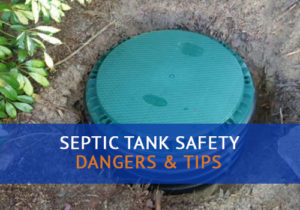Hidden underground, it’s easy to forget septic tanks are even there. Ideally they go unnoticed except for regular pumping and maintenance. But that can also make it easy to forget septic tank safely. But, what is dangerous about septic tanks and systems? What can you do? And what septic tank safety tips should every household follow?
Septic Tank Dangers
While numerous dangers can deal damage to your system (like parking on a drainfield), there is one area that causes the most damage to people: your septic tank.
Improper ventilation leads to explosive environments within your tank. As the bacteria in your tank break down solid materials, they produce organic gases. With poor ventilation, these gases continually build up and create Methane backups.
Also, the naturally occurring hydrogen sulfide converts to sulphuric acid when meeting wet surfaces. In the instance of the tank’s concrete lid, acid eats away the structure over time. Eventually, they cannot bear weight and collapse, potentially with you on it.
With all of this lurking under the surface, septic tank safety and knowledge are crucial. Knowing the dangers and how to avoid them keeps you and your family safe.
5 Septic Tank Safety Tips
Nervous? That’s okay. You can easily avoid septic tank dangers by following proper handling and septic tank safety rules. Knowledge is power.
#1 Use Sturdy Septic Tank Lids
 Not only do they allow easy access for maintenance, but septic tank risers and covers also don’t allow for easy walking or standing on the tank lid. Marking the septic tank with a lid is especially important for households with children. Additionally, find a septic tank lid that cannot be easily removed or moved.
Not only do they allow easy access for maintenance, but septic tank risers and covers also don’t allow for easy walking or standing on the tank lid. Marking the septic tank with a lid is especially important for households with children. Additionally, find a septic tank lid that cannot be easily removed or moved.
Knowing how and where your system and tank are located are equally important. Not only necessary for pumping and accessing tank lids, but essential when laying out the flow of your yard. When possible, try to steer traffic away from on top of your septic tank and system. Not sure where the tank is? Here are a few tips to find it.
#2 Never Work On a Septic Tank Alone
With build-up in methane gases, leaning over or breathing near a poorly ventilated tank can be enough to cause bodily harm. Always follow the buddy system. Your partner may notice a smell you hadn’t and is nearby should you need assistance.
#3 Never Enter the Tank
Unless you are a septic professional, never enter the septic tank. Septic tank professional have training and breathing equipment designed to address the dangers of entering septic tanks.
If someone falls into the tank, call emergency services. When possible, blow fresh air into the tank using fans. Never go in. Without the proper equipment and training, you’ve just created a dual-rescue scenario.
#4 Keep Flames Away
Methane gas is highly flammable. Keep all flames and fire starters away from your septic tank and system, including cigarettes. Tiki torches, fire pits, and fireworks should never be in the same area as the septic tank.
#5 Keep Surrounding Areas Clear of Hazards
Keep the area surrounding septic tanks free of hazards, debris, and tall grasses.
Debris and tall grasses hide the septic riser, making it easy to accidentally stand on top of your system without knowing. Some tall grasses, shrubs, and trees damage the structural integrity of your septic system. Only plant septic safe plants and trees when landscaping and clear debris quickly after storms.
When digging and landscaping, watch for pipes, electrical or mechanical lines critical to a safe, functioning septic system. If you notice any exposed lines, call a septic professional immediately.
While rare, septic tank dangers are real. The good news? They are preventable with septic tank safety knowledge and protocols. Always know where your septic tank is, keep up with regular maintenance to avoid gas buildup, and always clearly mark the septic tank lid. Think your septic systems need a check-up? Not sure where your septic tank is? Or notice something off or a funny smell? Call Advanced Septic Services in Clermont, FL today at 351-242-6100.

